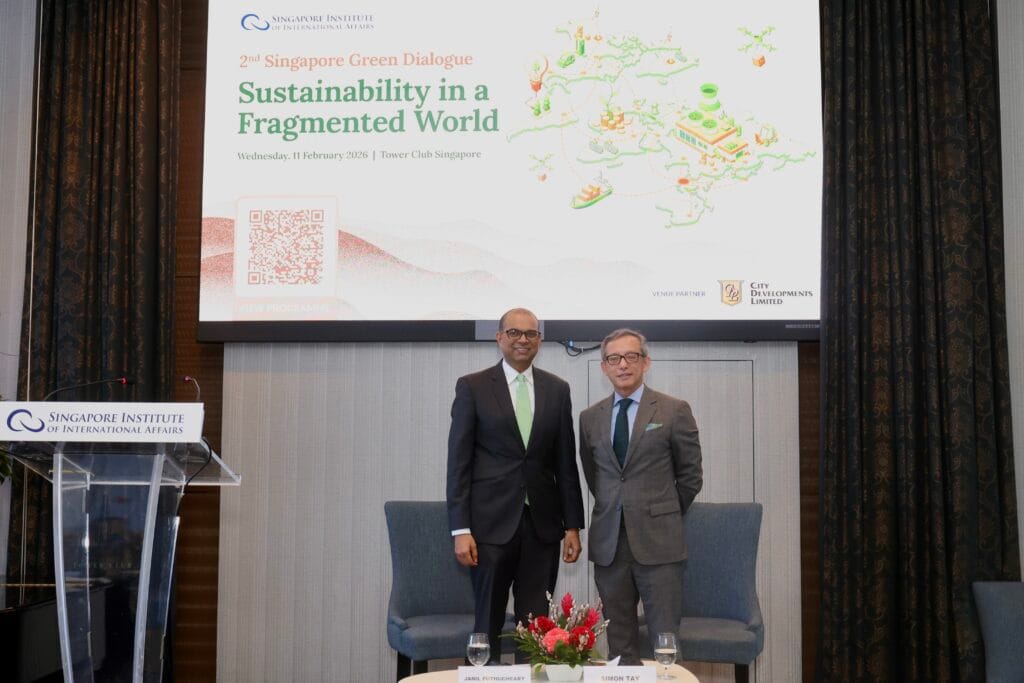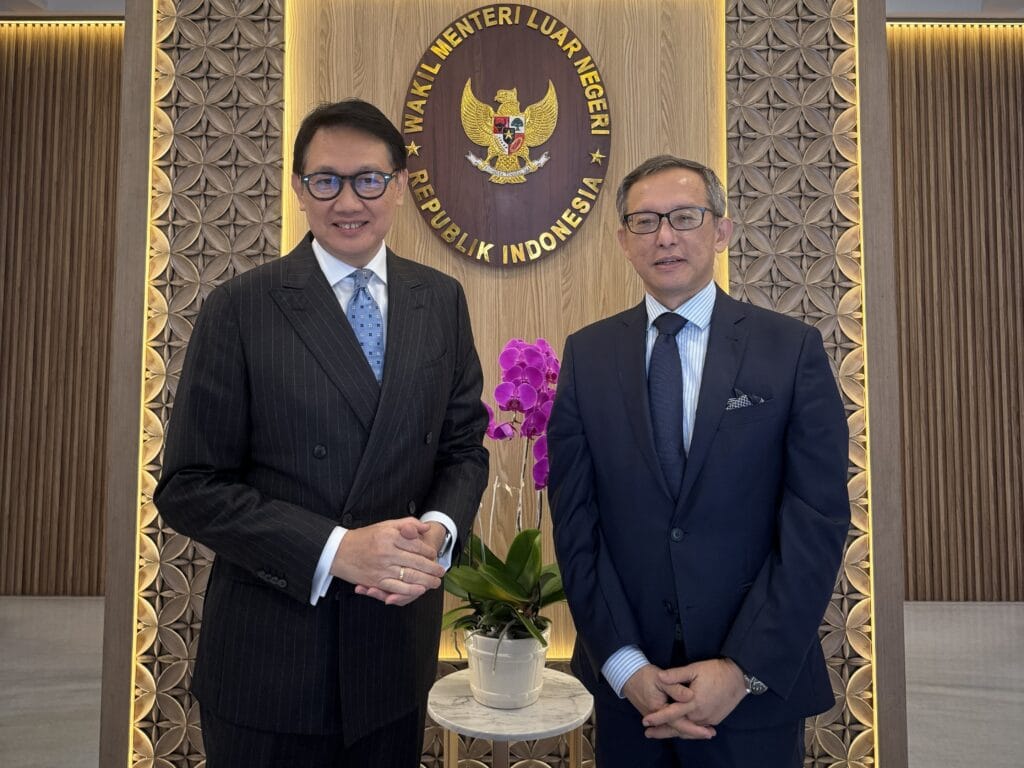Media Release
Immediate Release
Strengthening Japan-Singapore Partnership in the Regional Architecture:
17th Japan-Singapore Symposium
Delegates underscore pathways for enhanced cooperation between Japan and Singapore
Tokyo, 15 March 2024 – Amid a shifting global order and strategic challenges to the multilateral rules-based system, Japan and Singapore reaffirmed their strong ties and highlighted ways to cooperate on bilateral and regional matters.
2 The bilateral partnership was reaffirmed at the 17th Japan-Singapore Symposium (JSS), a Track 1.5 dialogue held on 14-15 March 2024 in Tokyo, Japan. The JSS is co-chaired by Ambassador Kenichiro Sasae, President, Japan Institute of International Affairs (JIIA) and Mr. Ashok Mirpuri, Head, International Policy & Governance, Temasek International and former Singapore Ambassador to the United States.
3 The JSS public forum opened with keynote speeches by Mr. Yoshifumi Tsuge, State Minister for Foreign Affairs, Ministry of Foreign Affairs of Japan, Ms. Sim Ann, Senior Minister of State, Ministry of Foreign Affairs and National Development of Singapore, and Mr. Taku Otsuka, Member of Japan’s House of Representatives and Secretary-General of the Japan-Singapore Parliamentary Friendship League.
4 Co-organised by JIIA and the Singapore Institute of International Affairs (SIIA), the JSS public forum had over 80 members of the public, academia, and the private sector from Japan and Singapore in attendance. The public forum was preceded by a full-day closed-door session of senior academics, business leaders and officials where both sides discussed issues in a frank and open manner.
5 In their opening remarks, the co-chairs noted that Japan and Singapore have enjoyed close bilateral relations for almost six decades, with strong ties encompassing people-to-people links, and close economic and political relationships. They recognised the opportunity to build even closer and deeper ties bilaterally and with the region. The co-chairs appreciated the pivotal role played by the previous JSS co-chair Ambassador Tommy Koh in fostering the Japan-Singapore track 1.5 engagement since the JSS’s inception in 1995.
6 In his keynote speech, Mr. Tsuge outlined that Japan-Singapore relations have been steadily progressing across a wide range of areas. Both countries are important partners that need to work together to address common challenges facing the region and the international community.
7 Ms. Sim Ann outlined key areas in which Singapore and Japan can work together to build a stronger and more stable regional architecture, focusing on strengthening cooperation at multilateral and regional fora, enhancing cooperation in the context of ASEAN-Japan relations, and deepening bilateral cooperation on issues of mutual interest such as the future economy, climate change and sustainability, and energy transition.
8 Mr. Otsuka emphasised the need for like-minded partners such as Singapore and Japan to protect the rules-based free and open international order.
9 At the public forum, Ambassador Kenichiro Sasae moderated a panel with:
- Amb. Masafumi Ishii, former Ambassador of Japan to Indonesia/Adjunct Fellow, JIIA/ Special Adjunct Professor of the Faculty of Law, Gakushuin University;
- Prof. Simon Tay, Chairman, Singapore Institute of International Affairs (SIIA);
- Dr. Tomoo Kikuchi, Professor, Waseda University, Graduate School of Asia- Pacific Studies; and
- Mr. Manu Bhaskaran, Founding CEO, Centennial Asia Advisors.
10 The public forum had a wide-ranging discussion on the regional political and economic architecture and the steps needed to manage the changes to global order. The panel reinforced the importance of the bilateral relationship and close ties with ASEAN to navigate new issues like digitalisation, sustainability and the energy transition. They highlighted the important role of key powers in the regional architecture.
11 Panelists proposed suggestions such as pursuing minilateral agreements and bilateral arrangements to address common challenges faced by Singapore and Japan such as the digital economy and decarbonisation. These areas of cooperation could strengthen the Japan-Singapore relationship and ASEAN-Japan connectivity into the future. They also spoke of reinforcing current agreements like the CPTPP, IPEF and RCEP where both Japan and Singapore played an important role.
12 The two co-chairs closed the forum by looking ahead to the next JSS and the ideas to be developed for closer cooperation between the two countries.
Photos from the event can be found here.
Media Contacts
Rohini Nambiar
Coordinator and Senior Assistant Director, Policy Programmes
Singapore Institute of International Affairs
Email: rohini.nambiar@siiaonline.org | Mobile: (65) 88929489
Hazeera Bi Wahid
Marketing & Media
Email: hazeera.wahid@siiaonline.org | Mobile: (65) 88909639
About the Japan-Singapore Symposium (JSS)
The JSS was launched in 1994 by then Prime Minister of Japan Mr Murayama Tomiichi and then Prime Minister of Singapore Mr Goh Chok Tong. It began as a Track 1.5 forum between the Japanese and Singapore government and business leaders, and scholars, focusing on business and economic cooperation and bridge-building between the two countries. Held biennially since 1995, the JSS provides opportunities for representatives of different sectors from both countries to exchange views on issues of interest, and get to know one another better. On 26 April 2016, on the occasion of the 50th anniversary of the establishment of diplomatic ties between Japan and Singapore, both countries announced that the JSS would be upgraded to an annual event.
About the Singapore Institute of International Affairs (SIIA)
Insights • Networks • Access
Established in 1962, the Singapore Institute of International Affairs (SIIA) is a non-profit and independent think tank committed to producing policy analysis, fostering in-depth dialogues and bridging gaps between policymakers, private sector decision-makers and experts to shape public policy and social responses. Centred around ASEAN focused themes, the institute aims to deliver policy analysis in international affairs and on issues driving environmental sustainability. The SIlA has been consistently ranked as one of the leading think tanks in Southeast Asia and the Pacific, in the Global Go To Think Tank Index by the University of Pennsylvania. Since 2017, the SIlA was ranked the No. 1 independent think tank in Asia. It was also recognised as one of the top 50 think tanks globally, excluding the United States of America. For two consecutive years since 2019, it was recognised as the No. 1 think tank in South Asia, Southeast Asia, and the Pacific (excluding India). In 2020, it was also recognised as one of the think tanks with the best policy and institutional response to the COVID-19 pandemic.
About the Japan Institute of International Affairs (JIIA)
JIA, founded in 1959, is a private, nonpartisan policy think tank focused on foreign affairs and security issues. In addition to conducting a wide range of research projects, the Institute promotes dialogues and joint studies with other institutions and experts at home and abroad, examines Japan’s foreign policy, makes proposals to the government, and disseminates information on international relations to the public. JIIA, together with its large network of affiliated scholars, aims to serve as an indispensable resource on international affairs in a complex world. For more information about JIIA, visit www.jila.or.jp/en/.




